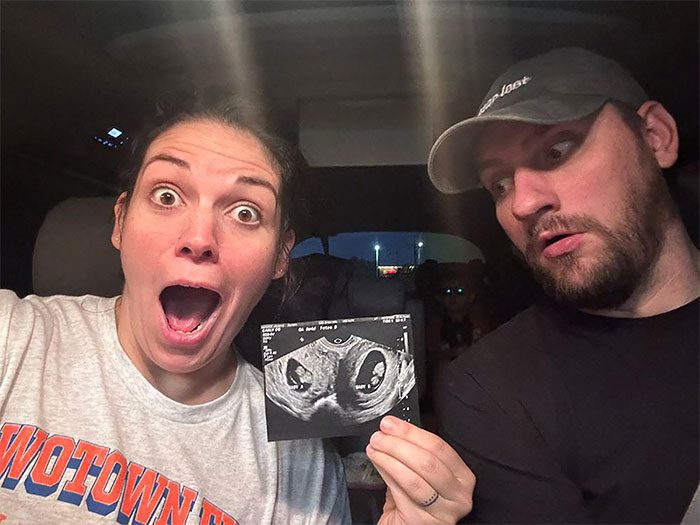A woman with two uteruses is pregnant in both of them in a rare case in the United States, according to doctors.
Ms. Kelsey Hatcher, who lives in Alabama, was born with a rare condition known as uterus didelphys, which means having two uteruses. However, she was unaware of this until she was diagnosed in the spring when her doctor informed her that she was pregnant in both uteruses with two baby girls, according to The Guardian on November 16.

Ms. Kelsey Hatcher shows an ultrasound image of the two fetuses in her womb to her husband Caleb on May 23. (Photo: AFP).
Ms. Hatcher, a 32-year-old mother of three, recounted her experience to her husband, who initially did not believe it was true. “He said, ‘You are lying.’ I replied, ‘No, I am not lying.’,” Ms. Hatcher shared.
According to reproductive researchers, the occurrence of two uteruses affects 0.3% of women and typically forms in the female embryo during the very early stages, around 8 weeks after conception.
Dr. Hayley Miller from the obstetrics and gynecology department at Stanford University School of Medicine stated that “the fact that both ovaries are releasing eggs simultaneously or nearly at the same time is quite astonishing.”
Ms. Hatcher is preparing to welcome the two baby girls on Christmas Day this year (December 25), while doctors are also expecting to have additional staff for this special delivery. The birth of a woman with two uteruses and two cervices is considered particularly challenging for doctors. “I have cared for many patients with two uteruses and two cervices, and it often presents challenges,” Dr. Miller said.
The babies could be born several hours or even days apart because the uteruses can contract independently. Ms. Hatcher’s doctors also noted the risks of a cesarean section for a woman with two uteruses, as the mother may experience more bleeding due to the need for two incisions.
While most people recognize this as a particularly rare case, some are debating whether to refer to the two soon-to-be-born babies as regular siblings or twins.


















































